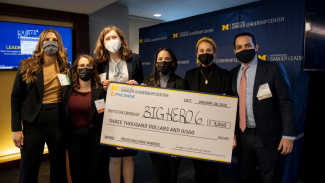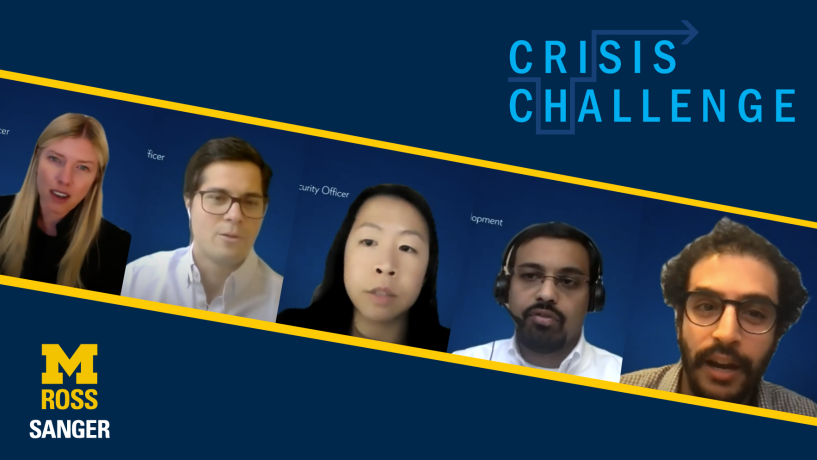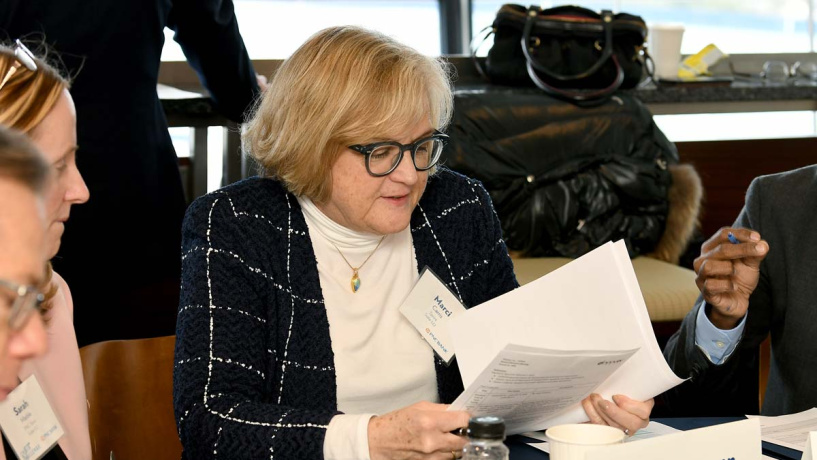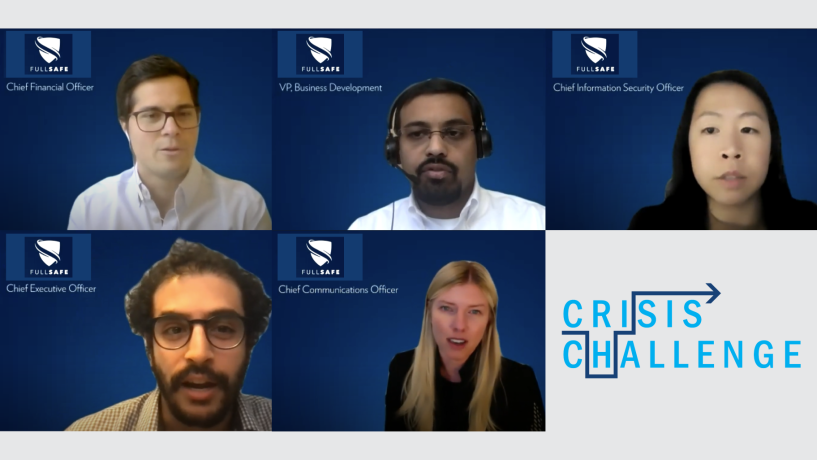Michigan Ross and U-M Students Navigate a High-Stakes HR Prejudice and Unconscious Bias Simulation During this Year’s Leadership Crisis Challenge

Six months prior to product launch, a whistleblower reveals your HR software as a service company is using artificial intelligence to make systematically biased decisions, not the unconscious bias-free decisions you promised to clients.
You and your executive team now have to quickly develop a solution to the PR nightmare. That is because in a matter of hours you’ll soon have to present that solution to a board of directors, all the while dealing with backlash from concerned stakeholders and the public.
That was the nightmare scenario presented to more than 170 graduate students from the Ross School of Business and 14 other colleges at the University of Michigan as part of the 2022 Leadership Crisis Challenge. The program, developed by the Sanger Leadership Center at Michigan Ross and sponsored by PNC Bank this year, annually challenges students to tackle high-stakes issues as a simulated crisis spirals out of control in front of them.
“Students learn best by living an experience firsthand, and the Crisis Challenge allows students to make complex decisions with incomplete information and a small amount of time to consider important tradeoffs,” said Jeff Domagala, managing director of the Sanger Leadership Center. “By challenging students in a fast-paced and high-stakes environment, they must demonstrate composure and poise. After experiencing this event, we know students will be able to apply many learned concepts to their future careers.”
2022 Crisis Challenge dives into issues of DEI and emerging technology
The 2022 crisis simulation was based on the case created by the winning team of Michigan Ross MBA students from the Diversity, Equity & Inclusion Global Case Writing Competition — organized by Ross, Sanger, and WDI Publishing — last year.
The challenge featured UtuHR, the HR SaaS company that claimed its new product, MardukAI, uses artificial intelligence and machine learning to remove prejudice and unconscious bias from all HR processes. As students learn from the whistleblower that the product makes systematically biased decisions that impact employees and company culture, they are given less than 24 hours to navigate the simulated crisis.
On the first day of the challenge, students began strategizing how to handle the crisis while receiving a flood of messages from UtuHR stakeholders. Students then worked late into the night developing a response plan to present to the UtuHR board of directors, role-played by 37 distinguished Michigan Ross and U-M alumni, faculty, and PNC employees.
Among the alumni who participated in the event were Betty Chu, senior vice president of the Henry Ford Health System, MBA ’13/MD ’95; Omer Ismail, partner at Trinity Life Sciences, BBA ’10; Dave Webb, vice president and treasurer at Ford Motor Co., MBA ’03; André Branch, senior vice president of MAC Cosmetics, MBA ’99; and Sean Whelan, CEO of Encore Rehabilitation Services, BBA/MAcc ‘94.
The top three performing teams from the board presentations moved on to the finalist round, where they faced real journalists — from outlets including the Detroit Free Press and Michigan Radio — in a simulated press conference. After tackling tough questions and listening to feedback from the audience, the judges chose the winning team.
Michigan Ross MBAs on the first-place team
A team of five Michigan Ross MBA students and one student from the Ford School of Public Policy was declared the winner of the challenge, earning a $3,000 scholarship. The winning team, Team Big Hero 6, was a mix of Online MBA and Full-Time MBA students. The two runner-up teams received a $1,000 prize.
Members of the winning team were Shayne Adler, OMBA '23; Andres Casas, OMBA '23; Alicia Hernandez, FTMBA ’23; Allison Llanso, FTMBA ’22; Emma Jabour, MPP '23; and Amanda Uphold, OMBA '23.
When the team first met at the start of the challenge, they reviewed their Michigan Model of Leadership Model strengths and set learning goals for themselves, which allowed the team to trust each other throughout the crisis. As a result, every team member said trusting each other led them to success.
"Our team first established our values, professional strengths, and goals for the challenge," Jabour said. "The group was a combination of folks who wanted primarily to learn and those who wanted to compete. Throughout the exercise, we respected both goals and established that we'd all benefit if we trusted each other with honest feedback and opinions on our approach and decision-making."
Jabour said she believes the team's willingness to contribute equally, lead without ego, value others' inputs, and support each other ultimately led to their success.
Overcoming challenges on their path to victory
The team worked together late into Thursday night and early Friday morning to prepare for the board of directors’ presentation and press conference. Casas said practicing answering anticipated questions as a team helped them collectively develop the best strategy and approaches for responses.
When it came time for the team to present to the board of directors and at the press conference, Adler said this was the most stressful part — but that her team motivated and empowered her throughout the process.
"There was general anxiety about being in front of so many people, but the team was genuinely engaged in the process, supporting each other, and trusting one another contributed to alleviating stress," she said. "It helped that these stresses were situational and not substantive, which ultimately further contributed to team unity."
It was Llanso's second time participating in the challenge. Her experience from the first challenge helped her set a new goal to focus on the team's overarching vision for the company.
"Last year, I felt extremely reactive," said Llanso. "I felt like I was responding to each fire rather than setting an overarching strategy and vision. My goal this year was not to get sucked into the stress of each email and update. Instead, I planned to focus on setting an overarching vision for where we want the company to go and how to find our way forward in the crisis from a macro perspective. I believe that this year, my team did this successfully. We kept the big picture in mind while looking at each component of the crisis as a piece of the puzzle rather than as an individual fire to put out."
Undergraduates across U-M will have the chance to expand their skills in leading high-pressure, high-stakes environments in the upcoming challenge on March 17 and 18.










